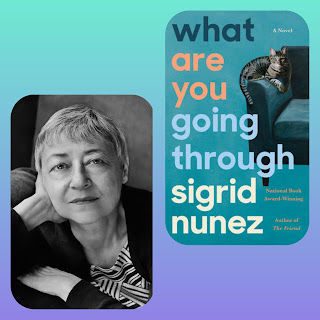Sigrid Nunez on All the Basic Questions We Deny to Answer
As René Descartes meditated on the nature of mind and warned that I can know my mind beyond doubt but it's nearly impossible to know the other's mind; however, I can imitate the great Dickensian phrase: It is the best of thing and it is the worst of thing that I don't have the direct sense data of what's going on other's mind, therefore, I will invite to take the medication as Sigrid Nunez has prescribed, "be kind, because everyone you meet is going through a struggle."
From The Friend's dog, Nunez hands us over to a Scheherazade-like talking cat in the constant serendipity of "What Are You Going Through" (Riverhead Books, 2020), that whispers the sibilant monologues and reflections of a voluntary childless woman who rents a room through Airbnb in a small cando of a "depressing" widow with a dead cat in late September 2017 to visit a terminally ill friend who is "swing between euphoria and depression" with her toxic relationship with her daughter, is asking the narrator to be with her till her last breath.
In between, she listens a "stern" professor's public lecture on from climate change to "surveillance capitalism" that increases the cost of commons against the benefits of elites and makes us metaphorically more slaves than free; and what would be life "without empathy, without conscience"; she encounters a man who is in a complete fears and worries about his mother's aging vulnerability; hears about a husband's utter negligence to his dying wife in the cancer rehabilitation group; she meets a woman at the gym who awakes from her slumbering of timeless skin and stops coloring her gray hair.
Ms. Nunez also kicks off the stories within stories: A misogynist killer ends in "a yearning for self-improvement"; a self-delusional queer professor kills himself after uncovering buried past that brings "a series of deep disturbances" in his present that only can remind us that humans are prone to live fictitious lives; two women's saddest stories that only echo Weinstein's jokes and misconducts; the legendary non-binary love triangle of Carrington-Strachey-Woolf that brought forth Lawrence’s Women in Love that only beg the questions of how does Woolf's fact turns into Lawrence’s fiction? And, do we need to have first hand experiences in every time to understand life? As Inger Christensen reflects, "as a life could have been different, but not until it's been lived."
This whole thing exposes the human nature of self-deniability - a halt or a distraction to embrace the true self - that brings the inconsolable conditions in life. As the woman at the gym denies the existence of the wrinkles in life and satisfying herself in thinking of "it happens to others, it happens to everyone else, but it won't happen to them." But it is also undeniable to believe that natural laws of aging are not equivalent to the socio-psychological laws. The metrics of getting old always fluctuate steadily between men and women. As woman A started to lose her exotic landscapes of beauty, her older husband walked to backward, oppositely, when woman B "stripped off the long-sleep shirt" in a streamy summer, a old man with a barking dog "made no effort to conceal his lust" and poured "a stream of lascivious burbles." Here, men don't forget to consume the Bachmann's fascist element of gender but forget to take a heed to Carter's assertion: "While behind every great man is a woman dedicated to his greatness, behind every great woman is a man dedicated to bringing her down." Carter's acknowledgement of women conditions resembles with the verses of Kazi Nazrul Islam (1899-1976), the national poet of Bangladesh, in his rebellious poem titled Naari [1925, Women, The Communist]:
Men's swords alone didn't ever see the victory,/Women's hearts also mused them, sourcing bravery/.../ Man with a dismantled heart,/To make a human, a woman donates her other half-part. (37-38,41-42)
Women stories are the saddest stories because they have learnt to live the lives with all of their fulfillments know the net valuation of compassion and love in life. I have observed that most widows had/have been living a life of subtraction as the narrator's friend in the novel has a journey of abandonment by her escapist boyfriend and sibling-like daughter, even in her vegetative stage of life full of burnt screams and tears. But things are actually not like that there are no rays of hope and mindfulness in life. As the readers will see when the friend rests her head up off narrator's shoulder and kissed, as if love were spilled over her cancer cells, her torments melts into sobbing, only then, she surrenders to the truths that the denial of aging and dying is anti-climatic and the acceptance of living and loving is art.
On the other hand, the narrator wishes to record the remaining days of the friend but she eschews herself to write the journal as she reflects upon that "the reality of what was happening could never be precisely expressed.... language would end up falsifying everything." And that meditation on the fluidity of lexical meaning is very much true in a sense as onsra means in Bado, a language of northeastern India, a feeling of love that "is destined but not to endure" but in English it is "to love for the last time"; as the French Quel est ton tourment? mutates into what are you going through? in English.
Reading Sigrid Nunez is like basking in the sun sitting on Yoga on a mountain top heading to the horizon with the Kafkaesque meaning of life to stop tormenting one's soul by the ripples of guilt and despair.



_-_Hap_Hadley_poster.jpg)
Comments
Post a Comment